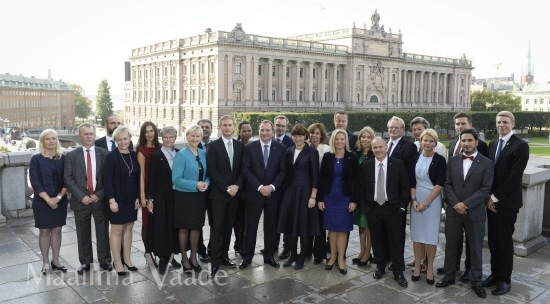The predictions came true. One of the most successful governments in Europe in recent years was defeated in national elections on September 14.
A couple of years ago, Swedish Minister of Finance Anders Borg was declared No. 1 in Europe by the Financial Times as Sweden largely escaped harsh consequences from the deepest economic crisis since the 1930s. Sweden rose in numerous rankings, lists and reviews, performing better than it had in decades. If you asked anyone in the world, they would say the four-party non-socialist coalition government that came into power in 2006 and was re-elected in 2010 should have sailed through this year’s elections almost unopposed.
It didn’t happen. After lagging behind in the polls the last year by up to 20%, the gap was narrowed by a fairly successful election campaign. While polling earlier gave the impression of a strong turn to the left in voters’ minds and was more or less confirmed by a strong red/green/pink (feminists) showing in the EP elections in May, the final result on election night was a disappointment for the left.
The winner was the xenophobic Swedish Democrats, which more than doubled its share of votes to almost 13%. As none of the other parties are prepared to rely on or co-operate with them, this created a difficult situation. The coalition government lost almost 10% of the votes, seven percentage points of which was shed by the Moderate Party and as a consequence Prime Minister and party leader Fredrik Reinfeldt resigned from both positions already on election night.
The only alternative for a new government had to be found over on the left. Before the elections the leader of the opposition, Stefan Löfven, had declined to declare which parties he planned to involve in a future government. He tried to give the impression that the Social Democrats might form a government by themselves. Fears were that he would have to include not only the greens but also the reformed old communists.
The election result was obviously a disappointment to the governing coalition but must have been equally disappointing for the parties on the left, which after eight years in opposition managed to gain a combined 0.01%.
Together, the three red/green/red parties would have created a government bigger than the exiting coalition in Parliament, thus creating a situation where the government proposals would always prevail as long the Swedish Democrats abstained.
But already on the day after elections, Stefan Löfven closed the door to the former Communists and the government he finally formed with the Greens is a very weak coalition, with less than 40% public support at the outset: This will have consequences. The governing strategy will start from government proposals drafted with the support of the Left Party. These forces will try to find support across the aisle, which will probably be difficult, because the non-socialist coalition has promised to stay together as a governing alternative for the election 2018.
Despite ambitions to find broadly based political solutions being a central theme, it was a surprisingly leftist programme for the upcoming four years the new Prime Minister published on Friday, 3 October. The new opposition reacted as strongly as he attacked and promised to dismantle central reforms on freedom of choice in education and health.
The ultimate test of the government will be when the budget has to be approved in the beginning of December. Will this very weak government be able to negotiate a majority budget with the Left Party that will not be voted down by the non-socialists supported by the Swedish Democrats?
Swedes live in interesting times.
A couple of years ago, Swedish Minister of Finance Anders Borg was declared No. 1 in Europe by the Financial Times as Sweden largely escaped harsh consequences from the deepest economic crisis since the 1930s. Sweden rose in numerous rankings, lists and reviews, performing better than it had in decades. If you asked anyone in the world, they would say the four-party non-socialist coalition government that came into power in 2006 and was re-elected in 2010 should have sailed through this year’s elections almost unopposed.
It didn’t happen. After lagging behind in the polls the last year by up to 20%, the gap was narrowed by a fairly successful election campaign. While polling earlier gave the impression of a strong turn to the left in voters’ minds and was more or less confirmed by a strong red/green/pink (feminists) showing in the EP elections in May, the final result on election night was a disappointment for the left.
The winner was the xenophobic Swedish Democrats, which more than doubled its share of votes to almost 13%. As none of the other parties are prepared to rely on or co-operate with them, this created a difficult situation. The coalition government lost almost 10% of the votes, seven percentage points of which was shed by the Moderate Party and as a consequence Prime Minister and party leader Fredrik Reinfeldt resigned from both positions already on election night.
The only alternative for a new government had to be found over on the left. Before the elections the leader of the opposition, Stefan Löfven, had declined to declare which parties he planned to involve in a future government. He tried to give the impression that the Social Democrats might form a government by themselves. Fears were that he would have to include not only the greens but also the reformed old communists.
The election result was obviously a disappointment to the governing coalition but must have been equally disappointing for the parties on the left, which after eight years in opposition managed to gain a combined 0.01%.
Together, the three red/green/red parties would have created a government bigger than the exiting coalition in Parliament, thus creating a situation where the government proposals would always prevail as long the Swedish Democrats abstained.
But already on the day after elections, Stefan Löfven closed the door to the former Communists and the government he finally formed with the Greens is a very weak coalition, with less than 40% public support at the outset: This will have consequences. The governing strategy will start from government proposals drafted with the support of the Left Party. These forces will try to find support across the aisle, which will probably be difficult, because the non-socialist coalition has promised to stay together as a governing alternative for the election 2018.
Despite ambitions to find broadly based political solutions being a central theme, it was a surprisingly leftist programme for the upcoming four years the new Prime Minister published on Friday, 3 October. The new opposition reacted as strongly as he attacked and promised to dismantle central reforms on freedom of choice in education and health.
The ultimate test of the government will be when the budget has to be approved in the beginning of December. Will this very weak government be able to negotiate a majority budget with the Left Party that will not be voted down by the non-socialists supported by the Swedish Democrats?
Swedes live in interesting times.
The new Swedish government posing for photographers in front of the parliament building in Stockholm, Sweden, on 3 October 2014. From left: Anna Johansson, Sven-Erik Bucht, Mehmet Kaplan, Helene Hellmark Knutsson, Aida Hadzialic, Kristina Persson, Margot Wallström, Ibrahim Baylan, Gustaf Fridolin, Alice Bah Kuhnke, Prime Minister Stefan Löfven, Mikael Damberg, Åsa Romson, Isabella Lövin, Magdalena Andersson, Anders Ygeman, Annika Strandhäll, Morgan Johansson, Peter Hultqvist, Ylva Johansson, Åsa Regnér, Gabriel Wikström, Ardalan Shekarabi and Per Bolund. Photo: Scanpix
Per Heister is the EPP Group adviser in the European Parliament |  |






